I’ve had the chance to meet tons of awesome tech professionals over the last 6 months.
I’ve been curious to find out more about their backgrounds and listen to them describe what it is that they do on a day to day basis.
The number one benefit of doing this has been that I’ve been exposed to a variety of new industries, roles, and opportunities.
I’ve learnt about why people have made certain career transitions, how they’ve successfully learnt new skills, and what advice they have for others hoping to do the same.
All I’ve been basically doing is going on coffee chats (over Zoom, of course). And sharing them with everyone on the internet.
I’m going to structure this article in the following manner, feel free to skip to the parts you find useful:
A coffee chat is an informational interview where you find out more about a person’s professional experience and goals.
If there’s only one thing you get from this article, it should be the following: a coffee chat is not a place for you to ask for a job. It may certainly help you land a role in the future (and I’ll talk about this later), but if you’re going into a coffee chat with the sole intent of asking for a job, you’re doing it wrong.
Instead, a good coffee chat’s primary purpose should be to build trust and for both individuals to get to know each other.
An obvious reason to go on more coffee chats is to increase your future chances of getting the role you want.
So assuming you want to work at Stripe on their Product team, you could go reach out to a product manager there and speak with them for 30min. Assuming the conversation goes well, you can continue to follow up and stay in touch for a few months.
Then, say a year later, when you apply for a new product manager position at Stripe, you can get referred, and sometimes you can even skip the whole line and directly meet with the hiring manager.
Another reason to go on a coffee chat is to find out about what a particular job role or industry consists of and to get information on how to break in. Here, you again reach out to someone who’s knowledgeable in a field and then ask them questions regarding what it is that they do.
So for example, let’s say I want to make a career transition into data science. I browse the data science subreddit and read a bunch of how-to posts and come across someone who’s written about their experience transitioning from biology to data science.
I decide that this person can give me useful tips so I send them an email and end up going on a coffee chat with them. This way, I can get direct advice from someone who’s done what I want to do.
If you’re reaching out to someone to ask for a job, you’re not asking for a coffee chat - you’re just asking for an interview. And that’s very different.
I recommend reaching out via email over Linkedin or Twitter. Everybody checks their email, even if they might not reply to you.
When sending an email to someone you want to go on a coffee chat with, keep it short and be specific. There’s probably a particular reason why you decided to reach out to someone - be sure to mention it in your email.
Here are two examples:
In my senior year of college, I wanted to get a job in tech. As an international student, I had to get sponsorship and this was quite a big issue - I wanted to chat with someone who had been through this process before.
I came across Jay’s Linkedin profile and realized that he was an international student who also had a similar economics related background to me:
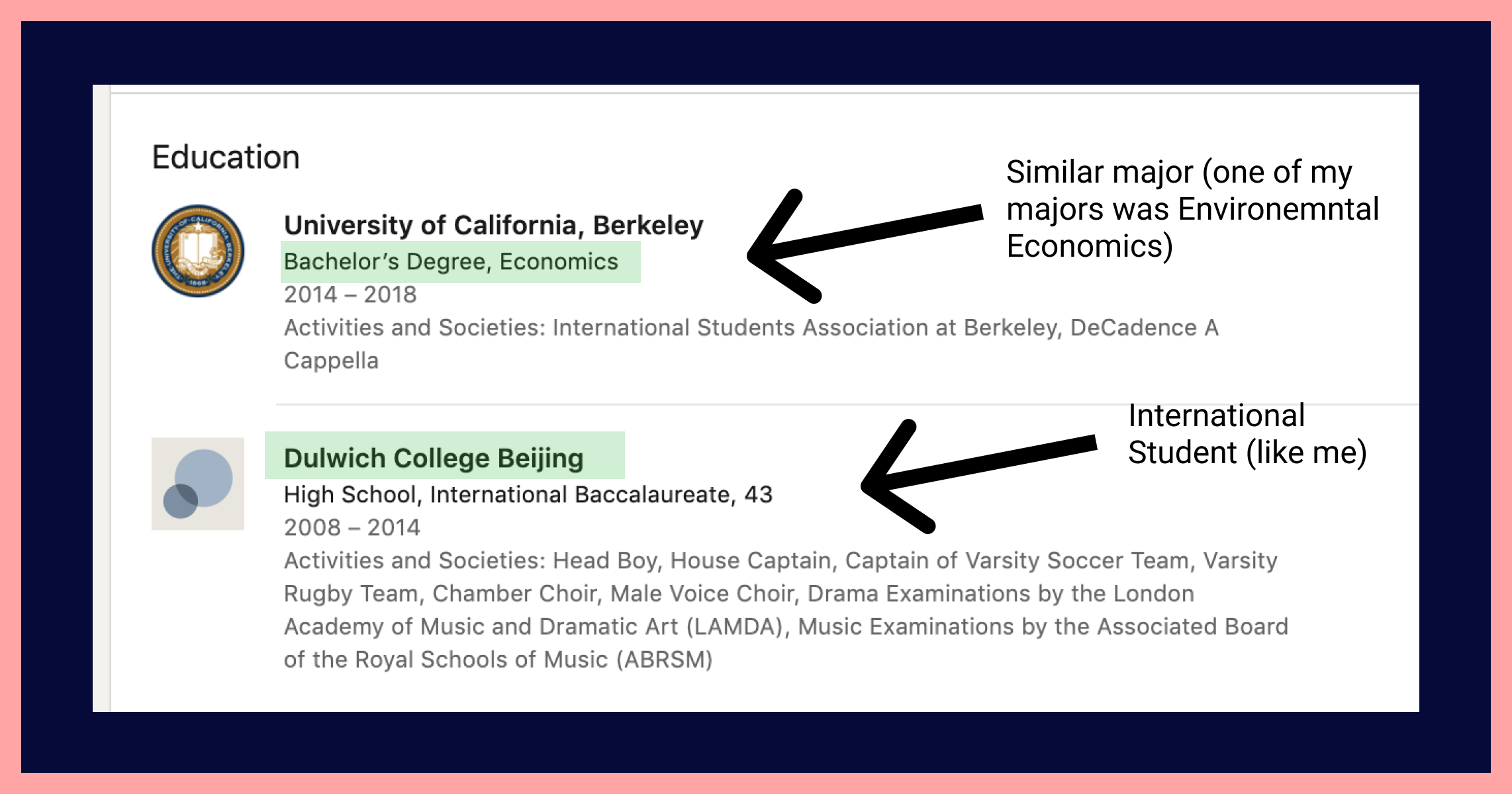
And he had also gotten a job in tech.
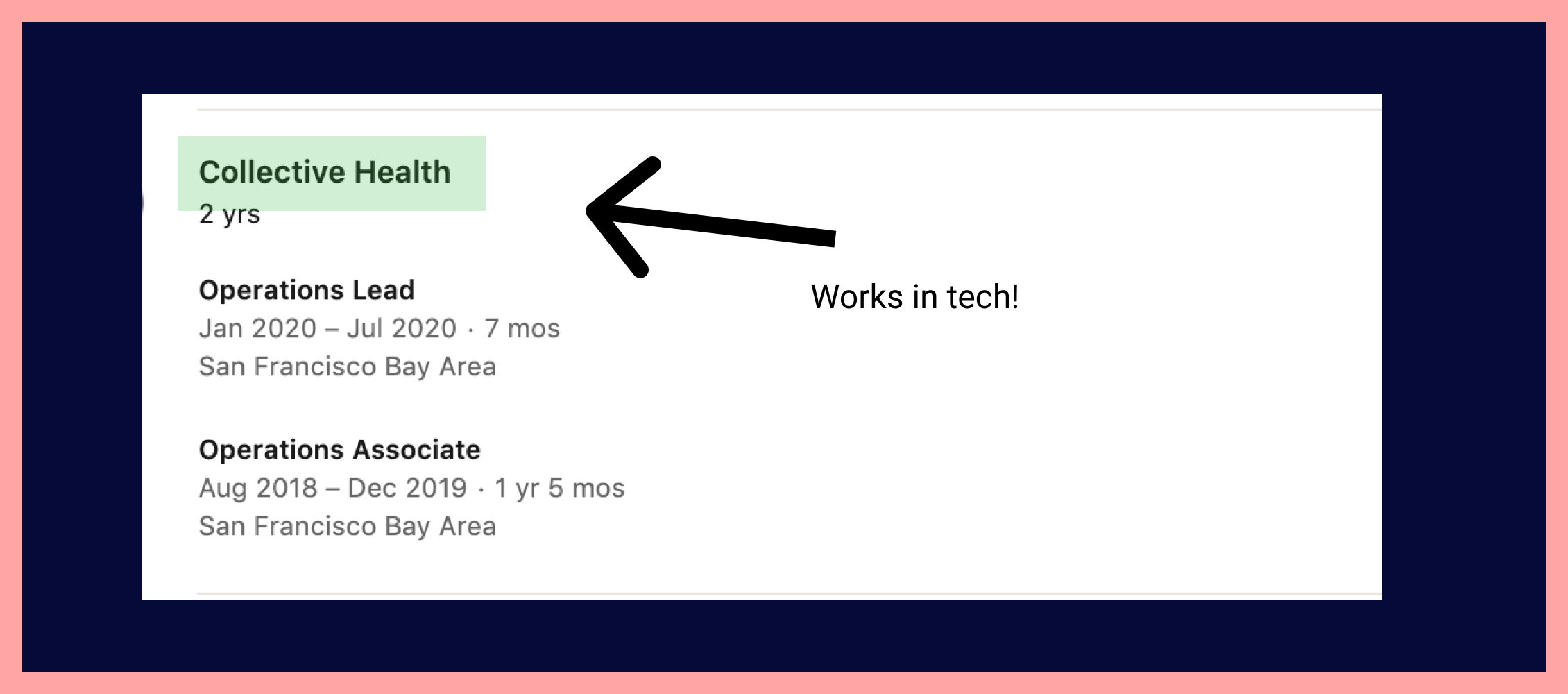
So when I reached out to him by email, I made sure to mention these things:
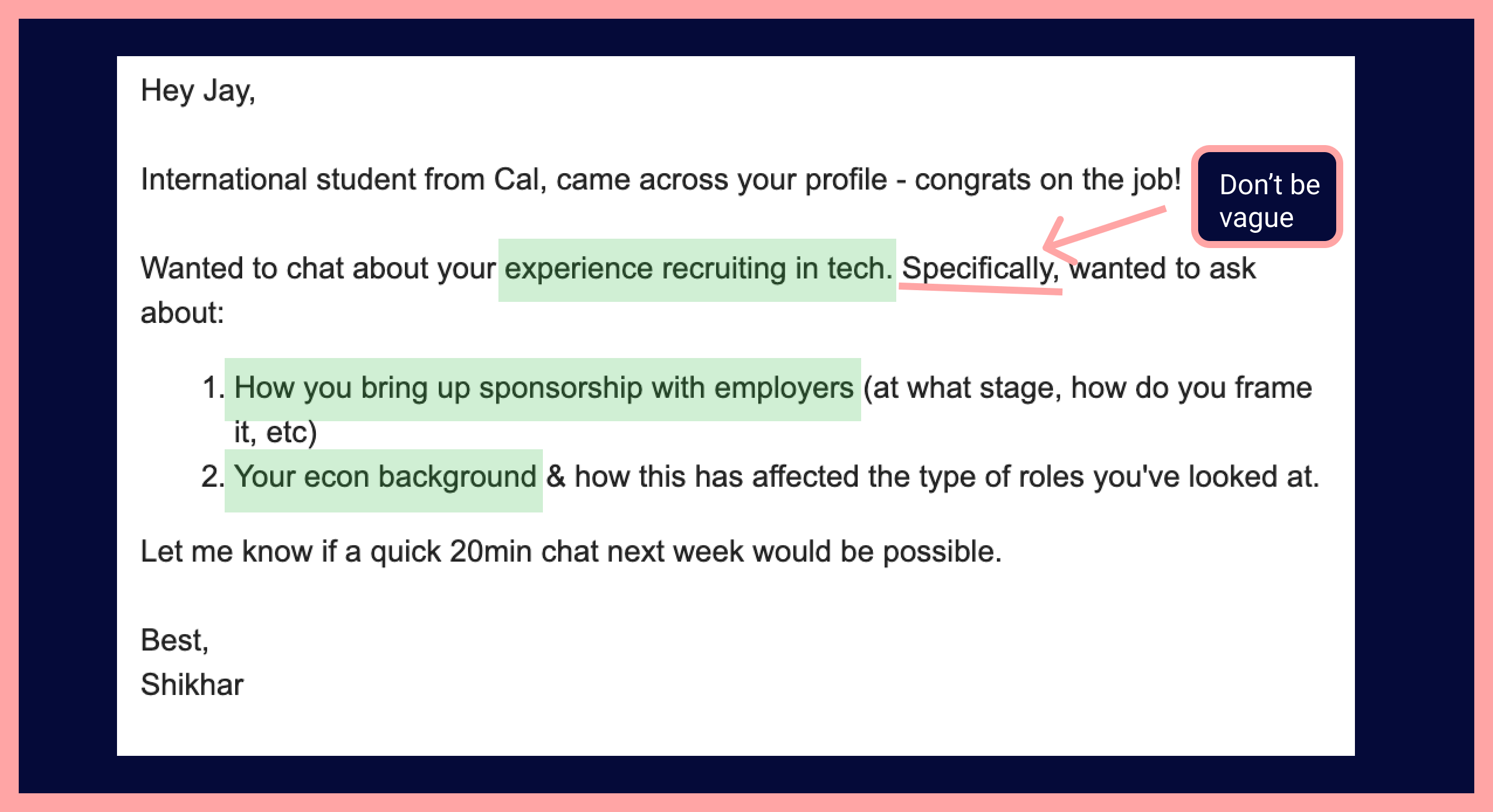
Notice how I didn’t say something generic like: “Would love to pick your brain”
Being specific when reaching out also makes sure that the recipient doesn’t think you’re randomly spamming people and sending the exact same copy to hundreds of people. You’re much more likely to get a response.
I reached out to Ayman Al-Abdullah, CEO of AppSumo, because I was genuinely interested in how he operates his business. Here’s part of the email I sent him:
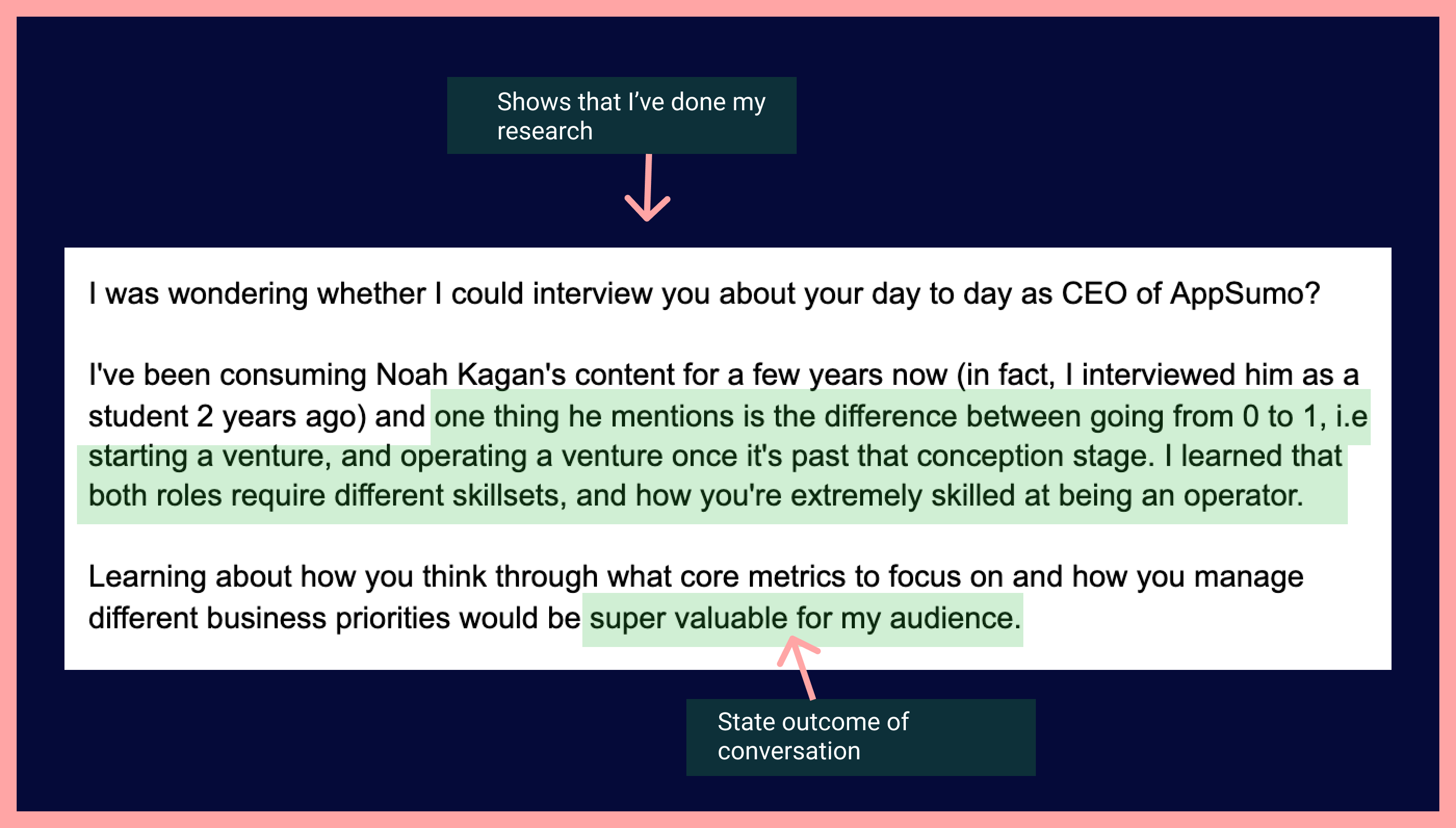
Again, I outline what I want to talk to him about and why I reached out to him.
This degree of personalization is what makes getting a response likely. Most people skip this part. Hopefully this also shows to you that a well crafted message can get pretty much anyone to respond - even the CEO.
Finally, realize that the worst thing that happens is someone says no or doesn’t reply. No big deal, you’re still alive. Realize that most people will ignore your email. That’s okay.
And no, you’re not being “pushy” if you choose to follow-up. Just make sure you’ve taken the steps above to write a good message.
Okay, so let’s assume you’ve got someone to respond and they’re down to have a coffee chat with you. How do you prepare?
Well, firstly, make sure you do prepare in advance. Someone’s given you their most valuable asset: their time. Don’t waste it.
When I’m about to speak with someone, I spend a minimum of 1 hour going through their profile and drafting up questions I want to ask them.
I’ll look at their Linkedin profile, see if they’ve published any blog posts, or if they’ve previously spoken on any panels. I’ll compile my notes in a google doc - here’s what my set of questions for Ayman looked like:
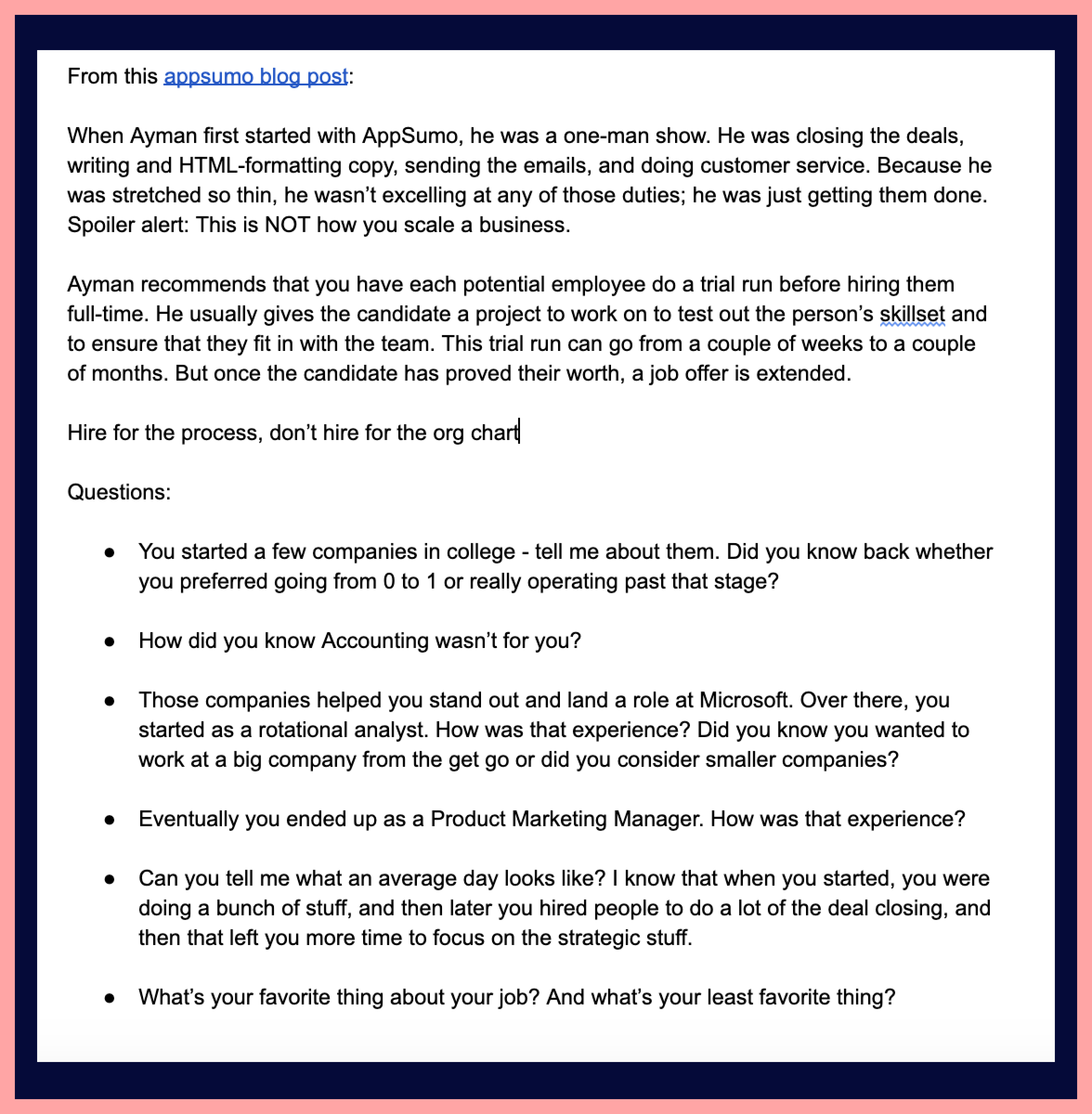
Your conversation will likely be scheduled for around 30min.
30min is a long time if you only have a few questions prepared, so make sure you go in with more questions than you think you’ll be able to get to.
If the conversation is going well, you’ll find yourself asking a lot less questions and having a more two-way discussion, but I still recommend doing your research upfront.
When preparing questions, don’t just ask questions you could have looked up. Try to go a layer deeper - so instead of merely asking “Why did you transition into X?”, ask “Given your background in Y, what appealed you to X? Am I right in thinking that given my interests in A & B, I’ll also benefit from a transition into X?”
Ultimately, though, your questions don’t need to be perfect. A coffee chat is just a conversation with another person. And as long as you’re genuinely interested in finding out about their professional journey (rather than begging for a job), you’ll come across well.
As I hinted at in the last section, whilst you should have a bank of questions to rely on, you don’t want the conversation to just be a series of questions and answers.
Instead, use your questions to add structure to your overall conversation, but let the discussion itself ebb and flow. Go on tangents - if something the other person says catches your interest, don’t be afraid to ask them about it.
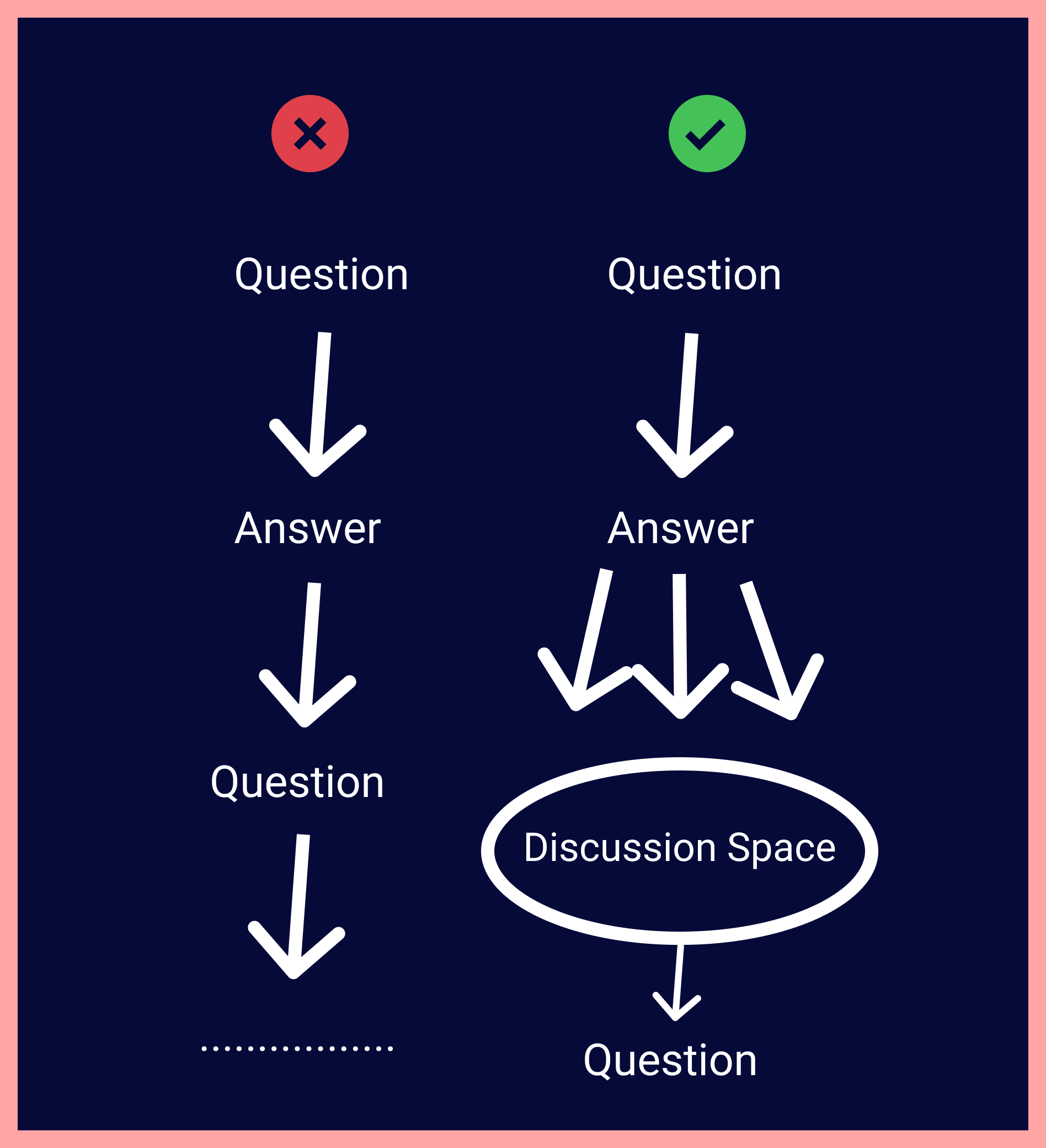
There is no script and there shouldn’t be.
Keep in mind, though, that your first few coffee chats will likely involve just a bunch of questions and answers. But as you go on more and get more practice, just like anything else, you’ll develop a habit of steering the conversation in a manner that doesn’t involve just Q&A.
Finally, I also recommend taking notes - not necessarily to remember what you discussed, but rather as a tool to highlight the important parts of your conversation and to internalize some of your learnings better.
Congrats, you’ve just made a new friend!
I recommend following up once right after your chat and sending a nice thank-you note.
Here’s one I recently got that I thought was good:
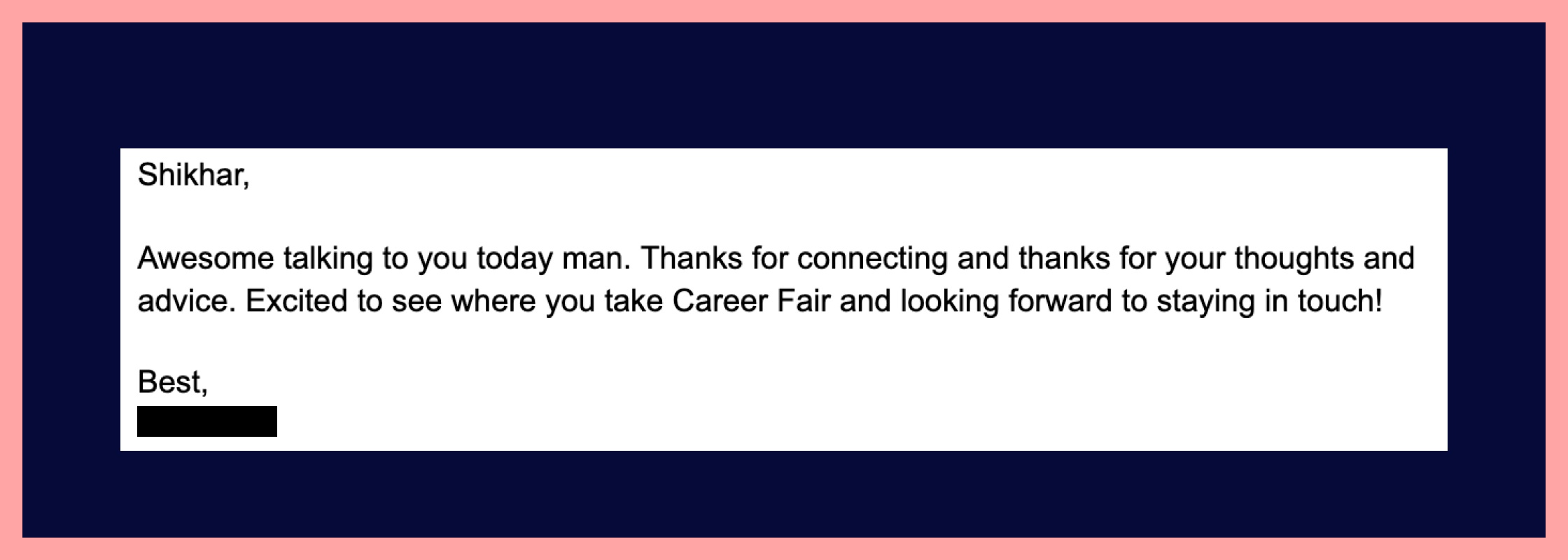
Then, in the coming months, if you work on something cool or explore any new opportunities that are related to what you discussed, make sure to let them know!
As a slight tangent - you might be surprised at how many people end up reaching out to you.
After one of my coffee chats, I got a recruiter from one of the people I interviewed's company reaching out to me asking if I was interested in a new role they had.
Going on coffee chats is one of the best ways to increase future opportunities that come your way.
All they take is a bit of outreach and prep. And I hope this guide has proven to be a helpful start.
Thanks for reading. I send out a weekly email newsletter containing my best content every Monday - I'd love for you to join by signing up below. Cheers :)
Some people call it a newsletter - I call it a good time. I write about tech careers and how you can get ahead in yours. It’s my best content (like this case study) delivered to you once a week.